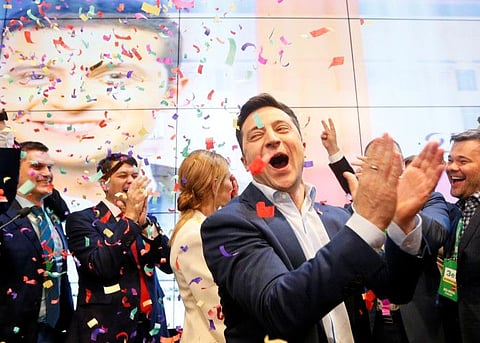Ukraine’s new unconventional president
Zelenskiy’s win a tantalising chance for Ukraine to find a suitable way of government

The landslide of comedian and TV producer Volodymyr Zelenskiy in last Sunday’s run-off presidential election in Ukraine poses a problem both for the country’s western backers and those in the Kremlin who hope to exert control again. Zelenskiy will be the country’s sixth president in almost 28 years of independence. That’s more heads of state than any other post-Soviet country has had. That in itself shows Ukrainians are hard to please. But Zelenskiy’s way of winning tells a more important truth about them: Ukrainians are loath to accept any kind of authority. That complicates Ukraine’s position as perhaps the world’s most important buffer nation, sitting between Fortress Russia and the North Atlantic Treaty Organisation’s (Nato) European flank.
It’s easy for an optimist to find nice things to say about Ukraine’s upcoming transition. Incumbent Petro Poroshenko, who spent his term consolidating power and trying to pick off rivals, is giving up his office peacefully, and he hasn’t made any kind of effort to rig the election. Zelenskiy is Jewish, and he speaks better Russian than Ukrainian, which means most voters have proved unsusceptible to hard-core Ukrainian nationalism, which is traditionally anti-Semitic and intolerant to all things Russian. Zelenskiy is only 41, and he’s not a member of the post-Soviet political elite, a self-serving bunch, and he’s a self-made millionaire with a successful production company.
Poroshenko’s strategy had been to stress his dedication to nation-building: An alliance with the West, strengthening the military, gaining spiritual independence from the Russian Orthodox Church, supporting the Ukrainian language. Handouts for the poor were also part of his campaign. He was going for a father of the nation image; even as he presented himself as the only alternative to Russian President Vladimir Putin’s taking over of Ukraine, he used a slogan once adopted by Putin: “There are many candidates but only one president.”
Zelenskiy beat him by ridiculing the paternalistic ambition, desacralising Poroshenko’s office and mocking his gravitas. The president wanted an earnest debate in a TV studio, but Zelenskiy forced him into an unprecedented face-off in Kiev’s biggest football stadium. The spectacle was preceded by a public drug test, which did nothing to hurt Zelenskiy, but subtly demeaned Poroshenko. During the stadium debate, Zelenskiy, who played an unlikely president of Ukraine in a TV series called Servant of the People, dropped easily to his knees before an audience of thousands, leaving Poroshenko no choice but to follow suit awkwardly.
Zelenskiy’s views, expressed in a few nebulous interviews and press conferences, emerge as vaguely pro-European and economically libertarian, but nothing he has said ties his hands in any way except the one promise he has consistently made: to consult the people before doing anything serious, through referendums or, for smaller issues, through some kind of social network-based, crowdsourcing mechanism. It’s no coincidence that the only Western leader Zelenskiy has met before winning the election was French President Emmanuel Macron, who has just held a nationwide “great debate” to solicit the public’s views on top policy matters.
Zelenskiy’s commitment to direct democracy is yet to be tested. It could merely be a clever ploy by his campaign advisers or a smokescreen for a weak presidency meant to restore assets and influence to the comedian’s enthusiastic backer and business partner, fugitive billionaire Igor Kolomoisky. Poroshenko and other Ukrainian politicians don’t seem to take this seriously yet. They’re making plans for the October parliamentary election (or an early one if Zelenskiy can find a legal way to dissolve the parliament so close to the end of its term), hoping to prevent Zelenskiy’s start-up party (called Servant of the People, of course) from gaining a majority. But if they do well and Zelenskiy is beaten back, he’ll have no other option but to turn directly to the people, and to Ukraine’s powerful civil society, every time he’s thwarted in parliament.
The high likelihood that Zelenskiy’s rule will be a direct democracy experiment poses challenges both for westerners hoping the country will remain on a path towards Nato and European Union membership and for Putin allies hoping Ukraine will slip back into the Russian fold. Neither group is likely to have reliable interlocutors in Zelenskiy’s Ukraine. Both will have to go directly to the Ukrainian people by any means they can find.
Whether a country as big, complex and besieged as Ukraine can be run in this way remains to be seen. But the roots of Ukrainian democracy are in the Cossack self-government of the 16th through 18th centuries, and the country appears to revert to them at turning points in its history. Today, progress requires, for example, a complete overhaul of Ukraine’s judiciary, and it’s possible that referendums and constant pressure from civil society are the only effective means to that end.
Zelenskiy’s victory is another tantalising chance for Ukraine to find a way of government suitable to its peculiar national character.
— Bloomberg
Leonid Bershidsky is a noted columnist. He was the founding editor of the business daily Vedomosti and Slon.ru.



